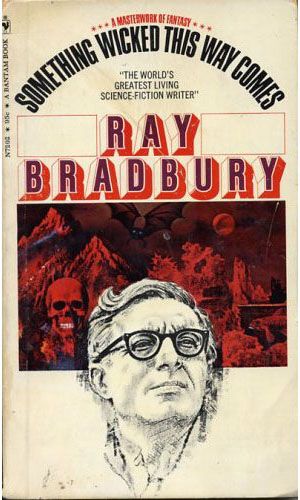Fantasies
Farewell, Rocket Summer: A Tribute to Ray Bradbury
A man with unrelenting enthusiasm for this Universe and its limitless wonders.
Posted July 3, 2012
[Note: Geek Pride invited guest blogger, writer William Orem, to offer a tribute to Ray Bradbury]

[Note: Geek Pride invited guest blogger, writer William Orem, to offer a tribute to Ray Bradbury]
Glasses are raised all around this summer to the late Ray Bradbury, a man with unrelenting, goggle-eyed enthusiasm for this Universe and its limitless wonders.
Bradbury wrote for more than seventy years with the ebullience most lose around puberty. He took science fiction into the realm of the heart, weaving passionate little jewels out of tourists in time machines, small town life on Mars, men trying to survive on worlds of unending rain.
And throughout, a gentleness—that’s really the word—that renders even the most ghastly interlude charming, in the manner of a Charles Addams cartoon. (I think here of the one about a man who comes to believe his own skeleton is trying to do him in—surely one of the most quirkily original concepts to be tried in a short story.)
I saw Ray Bradbury speak a decade or so back, along with Douglas Adams, at an auditorium in Indiana. The place was absolutely packed, and the place was a sports arena. Adams made them laugh with his own brand of geek humor, as was his special gift. Then Bradbury was wheeled out, already at that time an older fellow with snowy hair. He was talking enthusiastically, even as he came into view; you could sense that nonstop energetic flow, but you couldn’t hear it, because his contact mic was broken. A techie rushed onstage to give him a new microphone, and when it was finally turned on, the writer barked at us, “I said, how many of you read The Martian Chronicles?” The crowd erupted into cheers, which turned spontaneously into a standing ovation. When we finally settled down, I could hear Bradbury musing aloud, his ancient, youthful face suffused with pride.
“Ahhh,” he sighed happily. “All my bastard sons and daughters . . .”
Reading Ray Bradbury before age fifteen or so is transformative. Something Wicked This Way Comes was, hands down, the happiest imaginative experience of my early adolescence. If you are fortunate enough to have been given R Is for Rocket or Long After Midnight or The Machineries of Joy at just the right time in life, you already know what I mean. Rereading him in adulthood, of course, has its pleasures as well: an hour spent with Dandelion Wine is like stepping into the best summer morning you ever woke to as a child, the one where the world was wide open in front of you, July was going to last forever, and anything, absolutely anything, might be possible.
As a fiction writer myself who is also a part-time science writer, it seems to me that’s the correct attitude to take toward Mother Nature. Of the many gifts science has given us in the last few centuries, perhaps the greatest is simply a regular, repeated exclamation point—that experience of true astonishment in the face of What Is. Those vague smudges of light in your backyard telescope? They are actually “island universes,” whirling clouds made of billions, or even trillions, of suns. Latest guess at the total number of stars in the observable universe? Something like one hundred and twenty-three quintillion. So . . . have you heard about the multiverse?
On and on it goes, larger and wilder and more mysterious than anyone could possibly have imagined. Bradbury, too often pigeon-holed as a “children’s writer,” is the voice of all of us who cry Bravo! More, more! at this ever-expanding cosmos.
______________________________________________
William Orem writes about spiritual quest and philosophical questions. His first collection of stories, Zombi, You My Love, won the GLCA New Writers Award; his second collection, Across the River, won the Texas Review Novella Prize. His first novel, Killer of Crying Deer, was published in 2010; Reviewer’s Bookwatch called it “a serious novel, maybe even an important one, in the tradition of Moby Dick, Heart of Darkness and The Red Badge of Courage.” Orem also blogs for FQXI.org, web presence of The Foundational Questions Institute, an MIT-based organization that funds “deep questions” research in cosmology and high-energy physics. Currently he is a Writer-in-Residence at Emerson College. More info at: williamorem.com.


